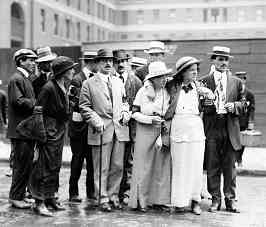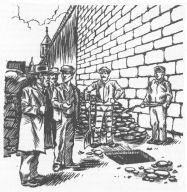a review of
Prison Memoirs of an Anarchist by Alexander Berkman. Annotated and Introduction by Jessica Moran & Barry Pateman. AK Press, 2017, (Originally published: 1912), 550 pp. akpress.org
“Thick clouds of smoke over cast the sky, shrouding the morning with somber gray. The air is heavy with soot and cinders; the smell is nauseating. In the distance, giant furnaces vomit pillars of fire, the lurid flashes accentuating a line of frame structures, dilapidated and miserable…The sight fills me with hatred of the perverse social order that turns the needs of mankind into an Inferno of brutalizing toil (that) grinds flesh and blood into iron and steel, transmutes human lives into gold, gold, countless gold.”

This vision could describe my old neighborhood near Zug Island in Detroit, home of the Ford Rouge Plant and United States Steel. Instead, it is Alexander Berkman’s impression of Pittsburgh in 1892, as he disembarks from a train.
At 21, he has already committed to perhaps ending his life in an extreme action to be taken on behalf of the striking workers at Andrew Carnegie’s Homestead Steel Works. The manager, Henry Clay Frick, brought in 300 ruthless Pinkerton private police to break the strike.
Berkman fails in an attempt to assassinate Frick at his office and is arrested. The strike was lost and the workers’ union broken.
Berkman wrote the prison memoirs following his release after serving 14 years of the 22 year sentence for the action. The critical questions he raises about his experience and the rationale for both the action and his ideals, remain relevant today.
The new edition includes material from Berkman’s diaries and letters, plus annotations which expand on what he writes giving the book a different feel than the version I read some 20 years ago. This one brings you closer to the history of the time, both for Berkman’s intimate circle and for the surrounding society.
When I first read it, I had never been in prison nor did I have any reason to think I ever would be. Still, like most of my anarchist peers, I felt it was important to offer support and reading material to incarcerated comrades. Now, having spent eight years on the other side of those walls, I understand just how important those acts of support are, and so did Berkman.
He writes, having received a letter from his friend, Emma Goldman: “The bars fade, the walls disappear, and the air grows sweet with the aroma of fresh air and flowers. I am again with you, walking in the July moonlight.”
In the book’s opening sections, Berkman explains his motivation for attempting to kill Frick, and his frustration at being misunderstood and having failed. But his words describing his relationship to Goldman (referred to as “the girl”) and his ever-increasing relationships in the prison use a different tone.
As the revolutionary, he is strident and confident. As the human being, he questions and considers, he changes his mind and admits when his judgment was in error.
At one point, Berkman quotes a conversation with a comrade and refers to himself as a revolutionary first, and then a man. This perspective suggests the phrase, “the righteous few” coined by Jonathan Matthew Smucker in Hegemony How-To (another excellent book by AK Press). It plays a big role in the sense that it was not only appropriate, but necessary for a cadre of revolutionaries to act on behalf of the workers. The small affinity group that Berkman, Goldman, and Modest Stein belonged to took this idea as a driving force in their lives.
Having only read a newspaper account of the strike, Berkman still felt compelled to take this as an opportunity and even as a duty to go to Pittsburgh and respond. The idea being that the action would spur the workers into further resistance if they felt supported in their efforts by the anarchists taking on Frick and Carnegie.
But even contemporaries sympathetic to Berkman, his cause, and his Ideal, were not persuaded by his arguments when they first read the manuscript. Voltairine De Cleyre, a friend of Berkman’s after his arrest, a long-time prison correspondent, and anarchist writer, poet, and organizer in her own right, believed that the casual reader would think Berkman was crazy.
De Cleyre disagreed with the tactic and its explanation, but maintained her solid support for Berkman nonetheless both at the time of his arrest and after. Support was divided among the many well-known anarchist proponents of the time, with Johann Most condemning it (much to Berkman’s chagrin and Goldman’s rage). Some of the most moving passages of the memoir are not the high-flying rhetoric of the young and idealistic Berkman, but the many conversations between him and individual strikers and prisoners that he records in what is meant to be colloquial language.
Berkman notes how certain guards and prisoners look for opportunities to indulge in senseless cruelty It is painful to read about the incidents that Berkman witnesses, the sound of clubs on human bodies, the screams and cries for medical aid that does not come, the constant begging for medicines that don’t leave their patients even sicker.
Things are better now than in Berkman’s time and yet a cursory reading of Prison Legal News will tell you that these abuses still occur.
More than the infrequent, but terrifying violence, Berkman describes the desolation of the human spirit that comes with isolation in the solitary units, from years away from sweethearts and family, that separates a prisoner from the free expression of their affectionate or sexual nature. This twists the prisoner’s responses, sometimes permanently.

Berkman treats the subject of consensual and exploitative sexuality in the prison with sensitivity and care. For its time, it was unusually positive towards homosexuality, a practice that prison staffs took care to deny existed at all.
Berkman’s memoir continues with his release from prison and re-entry into society. He notes how different it is for him having the support of a community and resolves to pay this back by writing his story and doing a lecture series.
He writes that the only reason he survived his time in prison (he alludes to at least one possible suicide attempt), is that he was sustained in his suffering in solitary and in the dungeon by his beliefs.
He writes:
“It was the vision of an ideal, the consciousness that I suffered for a great Cause. It was my duty to exemplify the spirit and dignity of the ideas it embodied. I was not a prisoner, merely; I was an Anarchist”.
Despite what were painful months adjusting to free life, Berkman begins to enjoy walks in the woods again and conversations with political allies without the shroud of prison cutting him off from others. He even falls in love. The diaries tell us this part of his life as a free man, written with a funny and irreverent perspective, whereas the earlier part of the memoir is much more didactic.
The comments on the constant nature of jealousy, even among the proponents of polyamory and free love, are written with a wry and warm insider’s view. One is able to see Berkman as much a man as a revolutionary. It is this balance that makes his story more accessible and poignant to those of us reading his words in this century.
More than anything, this story of survival and recovery, of reconnection and responsibility to one’s beliefs, is a morality tale for us now Prison experience changes who you are fundamentally and haunts you.
I will carry the prison around in my mind for the rest of my life. But I am encouraged that perhaps, even so, like Alexander Berkman, I will continue to find the strength, direction, and purpose of my cause both here in prison and in whatever future free life I might have. This fills me with courage and peace.
There aren’t a lot of books that can do that for you.
Marius Mason is an anarchist, environmental and animal rights activist currently serving nearly 22 years, like Berkman, in federal prison for acts of property damage carried out in defense of the planet.
He is believed to be the first FtM prisoner to win the right to hormone therapy to treat gender dysphoria.
Marius can receive letters addressed to:
Marie (Marius) Mason #04672-061
FMC Carswell, P.O. Box 27137
Fort Worth TX 76127
Support site: https://supportmariusmason.org/
Related
“Tony” Revealed by Gary L. Doebler, FE #377, March 2008
Alexander Berkman’s Prison Memoirs annotated: an interview with Jessica Moran and Barry Pateman, KSL Bulletin 89
